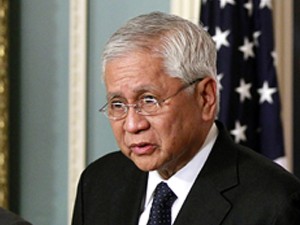DFA chief to China: Shun war
Foreign Secretary Albert del Rosario on Wednesday warned against settling disputes by armed force as China sent nearly 100 vessels to Scarborough Shoal, raising tensions with the Philippines in the disputed waters in the West Philippine Sea (South China Sea).
Speaking before a United Nations General Assembly high-level meeting on mediation, Del Rosario stressed that “the cost of conflict is too high in lives lost, in futures destroyed and in what must be done to rebuild.”
“The Philippines was invited to speak as a leading voice in global mediation efforts,” said the Department of Foreign Affairs (DFA).
“We had to learn our lesson the hard and tragic way—by opening our doors to the pain, loss and suffering that the scourge of war can bring,” Del Rosario said.
Del Rosario is leading the Philippines’ efforts to bring the Scarborough Shoal dispute to the International Tribunal on the Law of the Sea (Itlos). Beijing has rejected international mediation and begun to put an economic squeeze on Manila by suspending tourism to the Philippines and tightening inspection rules for Philippine banana exports.
Del Rosario reminded UN member-states that settling disputes by peaceful means was what united them to build the organization 60 years ago.
Equality of states
The UN Charter, Del Rosario said, “also mandates the observance of the doctrine of the sovereign equality of states.”
But “the sad reality is that the vast political and economic differences between states, including those in dispute, often render this doctrine dead letter law,” he said.
The high-level meeting on mediation was convened and chaired by Nassir Abdulaziz al-Nasser, president of the UN General Assembly.
Nearly 100 vessels
Del Rosario has yet to comment on reports that China has increased the number of its vessels at Scarborough Shoal to 92 from 77 earlier this week. The vessels included four government ships, fishing and utility boats.
The Philippines has only two civilian vessels at the shoal, which both countries claim.
Vessels from both countries have been facing off with each other at the shoal since April 8, when Philippine authorities tried to arrest Chinese fishermen for poaching in the area.
On Monday, the DFA handed Chinese Ambassador Ma Keqing a diplomatic note—the seventh since the standoff began—to protest the increase in the number of Chinese vessels at the shoal.
The Philippines accused China of intensifying tensions at the shoal despite ongoing talks to settle the dispute peacefully.
Importance of mediation
In his remarks at the UN meeting, Del Rosario stressed the importance of mediation in settling disputes between small and large rival states, as in the dispute between Philippines and China over Scarborough Shoal.
“When parties are in a dispute, differences in political and economic power can often weigh against a fair, just, peaceful and lasting resolution,” Del Rosario said.
“Mediation and other third-party mechanisms can level the playing field,” he said. “These help ensure that although one party may lack in power, it can make up for it through reliance on the rule of law.”
The Philippines believes in “mediation and other forms of third party dispute settlement, including judicial settlement, not only in principle but definitely in practice,” Del Rosario said.
Immediate withdrawal
Manila demanded that Beijing immediately withdraw the vessels, saying China’s actions violate Philippine sovereignty, its exclusive economic zone, the Declaration of Conduct on the South China Sea signed by China and Southeast Asian countries, and the UN Charter.
The Chinese foreign ministry responded by accusing the Philippines of “provocative actions” that its spokesperson Hong Lei did not specify.
Hong said the Chinese vessels at Huangyan Island—China’s name for Scarborough Shoal—were working in the area according to “related Chinese laws and the fishing moratorium issued by the Chinese government.”
The Philippines does not recognize the Chinese moratorium, but has declared its own fishing ban for conservation of marine resources in the area.
On Wednesday, DFA spokesperson Raul Hernandez reported that the Chinese vessels continued fishing and collecting protected corals despite China’s fishing ban.
Yesterday, Hernandez said the Philippines was “exerting efforts to defuse the tensions in the area.”
In a text message to the Philippine Daily Inquirer, Hernandez said the Philippines hoped China would respond positively and refrain from further “actions that would “escalate tensions” at Scarborough Shoal.
Peaceful settlement
“Mediation forms an important part of a rules-based approach to the peaceful settlement of disputes. It is for this reason that we are pursuing this course in hoping to resolve the conflicting claims in the West Philippine Sea, as well as in addressing the internal conflicts in my country,” Del Rosario said.
He cited the Manila Declaration on the Peaceful Settlement of Disputes, adopted in 1982 by the UN General Assembly, which, he said, “remains relevant.”
“The declaration stressed what is sometimes forgotten—that sovereign states that make up the world community are under a legal obligation to settle disputes in a peaceful manner,” Del Rosario said.
This is the most fundamental of legal norms in our world. If this most basic norm did not exist, there would be no substratum or infrastructure on which international law could rest on.”
